
Transforming organizations from the inside out
Heather McGhee
Heather McGhee, Distinguished Senior Fellow at Demos, shares the lessons she learned as the think tank’s former leader and ideas for building effective nonprofits.
Transcript
[Transforming organizations from the inside out. Heather McGhee, distinguished senior fellow, Demos. A Black woman with a broad smile and dreadlocked hair, wearing a wool blazer.]
ANNOUNCER: Please welcome Heather McGhee.
[applause]
HEATHER MCGHEE: When I became president of Demos, I didn’t have to change anything. I’d been working there happily since I was 22 years old. I respected our impact and I cared deeply about my colleagues. Like most think tanks, my organization was majority white—the figure at the time was about 75 percent—and it had been founded by white men. I was the only person of color in executive leadership. But we’d gotten along just fine with that makeup, and in many ways our mission of addressing solutions to inequality in our democracy, in our economy, was going forward and we could get along with whatever racial analysis people brought into their work. But, as I’d done the work over the course of a decade, I’d come to see that it wasn’t just that race was a multiplier of inequalities, that people of color fared worse in an unequal system, it was that racism was a driver of the inequality for everyone. Take our work, supported by Ford for over a decade, to reform the financial system.
Now, I remember so vividly, standing on the corner in a black middle-class neighborhood in Cleveland, in the mid-2000s, and sobbing, because the street was riddled with foreclosures. Because rapacious lenders had experimented on black homeowners with impunity, stripping their wealth and then moving on to take those same tactics across the country, and then bundle them up into millions of designed-to-fail mortgages and spread them across the global markets. We wouldn’t have had a financial crisis if it weren’t for racism. Or, take our work to expand our democracy. The barriers that we at Demos were trying to dismantle were erected after Reconstruction to keep black people out of power. And now they keep nearly 51 million citizens of all races from voting. And so, with this insight about the centrality of racism to the inequalities that affect us all, I set out to transform our organization. I had the wind at my back of the capacity-building support of Ford’s extraordinary BUILD program, and we made an ambitious plan. Four years later, when I handed off the reins at Demos to my incredibly talented successor, Sabeel Rahman, we had a majority person of color think tank.
So, what did we learn along the way? First, take the time to develop your core rationale—why the transformation you seek is mission critical. Transformation work can’t be a nice-to-have. It has to be a must-have. Or else it will always get deprioritized when the world is on fire. Second, assess everything. Our racial, gender, and class, diversity, of course, but also each individual’s level of fluency. Their ability to confront racism and work with self-awareness, evaluate it, train towards it, and hire for it. Third, get comfortable not knowing. We developed a robust curriculum and, most importantly, unlearned a whole bunch of toxic beliefs that even good liberal folks like us had carried into our work. Fourth, be willing to make new friends and lose some. Our transformation work led us to intervene in a field where we’d been long established, bring in new partners, and upset a few apple carts. Fifth, allow people the room to grow. Believe in the power of the change. Even those of us leading the work had a lot to learn. We made mistakes. It’s in the recovery. I’ll never forget the moment when a heretofore painfully shy, white female economist felt so ready and empowered, that she went on Fox News to debate and defend the validity and the aims of Black Lives Matter. That was a proud moment for me. And, finally, do it with joy. While the reality of stubborn racism is painful, the world we’re fighting for, where we unleash the full human capacity of our beautiful diverse demos, is one we should celebrate right now along the journey.
Next year, I’m happy that I’ll be able to give you a copy of my book about the ways that racism harms us all—not just people of color, but white people too, and our entire society. And I’ve done so with the conviction that despite our deepening divisions, there is a place where our interests meet, and, as I’ve experienced firsthand, human transformation is always possible. Thank you.
[applause]
[New gospel of wealth. What does #GenerosityToJustice look like to you? Ford Foundation dot org forward slash new gospel.]
Accessibility Statement
- All videos produced by the Ford Foundation since 2020 include captions and downloadable transcripts. For videos where visuals require additional understanding, we offer audio-described versions.
- We are continuing to make videos produced prior to 2020 accessible.
- Videos from third-party sources (those not produced by the Ford Foundation) may not have captions, accessible transcripts, or audio descriptions.
- To improve accessibility beyond our site, we’ve created a free video accessibility WordPress plug-in.
“Human transformation is always possible.”
Heather McGhee
Idea
Chairman and CEO of Merck & Co, Inc. Kenneth Frazier, shares how we can all champion the cause of justice.
Idea
Emerson Collective Founder Laurene Powell Jobs discusses what brings her joy as a philanthropist.
Resource
Purchase a copy of A New Gospel of Wealth: From Generosity to Justice.